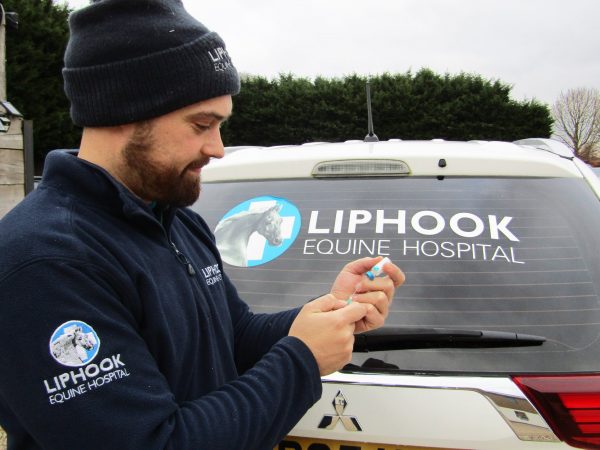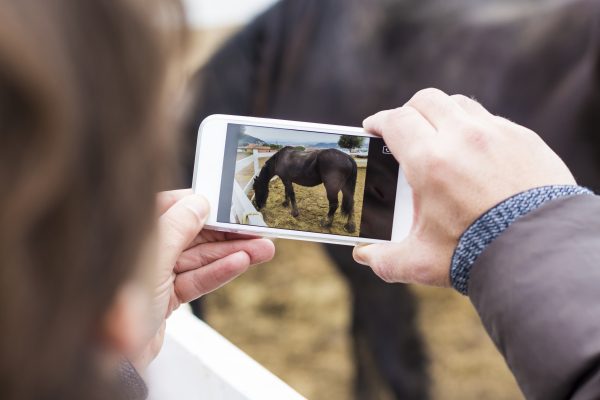
News
Archive for the General Category

In accordance with current government guidelines, we will only be able to provide on-site emergency veterinary care.
We can now offer telemedicine consultations to provide the best veterinary support for you and your horse. We can arrange a telemedicine consultation to allow you to access veterinary care at this time.
Our telemedicine service will enable us to assess your horse, answer your queries and to help you provide the best care for your animals.
If you would like a telemedicine consultation with one of our vets, please call the practice on 01428 723594 to book an appointment. All telemedicine consultations will be charged.

Make sure all your horses’ needs are covered in case you have to self-isolate or are taken ill.
Click here to download our care plan form to give to your yard or a friend who will look after your horse if you can’t.

Just to reassure everyone with samples they wish to submit that we are still offering a full laboratory service. Our protocols have changed considerably in view of essential measures regarding coronavirus, but the only change you might notice is the telephone system will divert to various admin staff working from home now so please allow a few more rings than normal. We are all in close communication using remote means and will be able to deal with queries as well as samples as normal. I hope you are all managing at this difficult time.
Further to the Prime Minister’s announcement last night and at this time of National Emergency our vets will be doing emergency work only with immediate effect.
As vets, our jobs are about protecting animal health and welfare but we now find ourselves in a position where it also our duty to do everything we can to protect human health, particularly those in our community who are most at risk.
We will be ensuring that any of our employees that can work remotely from home. As these employees make the transition, we might see an impact on wait times for our phone or email service today (Tuesday 24th March). We greatly appreciate your patience and understanding as we work through this together.
We are committed to providing a service for those animals in genuine need of emergency care. Our vets and staff will obviously continue to be available on the phone to give you advice and discuss any concerns you may have about your horse’s health.
Stay at home and stay safe!
We hope you are all well and following government guidelines to stay safe whilst taking time to enjoy the companionship of your horses in these challenging times.
As vets, our jobs have always been about protecting animal health and welfare but each day we have seen new and essential guidance from the government. We now find ourselves in a position where it also our duty to do everything we can to protect human health, particularly those in our community who are most at risk.
Consequently we have reached the decision to stop all non-essential work.
We are cancelling all booked in work thereby limiting the movement of individuals and potential spread of COVID-19. This morning we will be contacting everyone with appointments already booked in. We expect our phone to be very busy so please wait for us to contact you.
We ask that if one of our vets does have to come to visit your horse in the event of an emergency that you ensure that you maintain excellent social distancing and we will work to do the same.
Your horse’s welfare is very important to us, as is the health of everyone in our community. If you are concerned about your horse’s health in any way, please phone our office in the first instance and we will be very happy for one of our vets to speak to you and give you advice.

Covid -19 & Liphook Equine Hospital
We appreciate that with the spread of the Covid-19 pandemic through the UK that this is a worrying time for everyone. As the prevalence of the virus increases in the UK, we want to reassure you that we are taking precautions to ensure that we can continue to be available to look after our equine patients.
So what are we doing?
Ambulatory Vets
- We are minimising contact between our ambulatory vets and other hospital staff so that if one of them falls ill, the risk of everyone else falling ill at the practice at the same time is minimised. Our ambulatory vets are working out of vehicles as normal but are basing themselves at home, with only essential trips into the hospital to restock their cars
- Biosecurity is not a new concept for us in the equine industry, as many of you are only too aware, and so we continue to ensure that our strict biosecurity policies are maintained
Hospital
- We will be asking office-based staff to work from home
- We are aiming to reduce the number of personnel visiting the hospital. We request that the number of people coming into the hospital with a horse is minimised and we will be doing more communications via telephone and email to avoid face-to-face contact
- Enforcing social-distancing between staff and staff and clients as much as possible
- Clients will be asked to wait in their cars or lorries rather than sit in the reception area
- Visits to inpatients will be via prior appointment only
- We have ensured that sufficient veterinary supplies are in stock and have a contingency plan to ensure that that continues
How can you help us?
- We will be asking all clients requesting a visit to and visitors to the hospital a few basic questions to ensure that we are not exposed to unnecessary risk e.g. questions about recent travels; whether you feel unwell; whether you have been in contact with anyone else who is unwell. We are still happy to attend your horse but may have to take some extra measures to safeguard all involved
- We would also be grateful if the number of personnel “horse side” is minimised where possible – it is difficult to screen unexpected “visitors” before we arrive thus potentially creating unnecessary risk for all
- Please make sure you use the hand sanitisers available when you visit the hospital. Frequent hand washing is one of the most effective measures we can all take to protect ourselves and each other
- If your health status changes AFTER a visit or appointment is arranged, please let us know
- If you need to come to the hospital for any reason (eg collect medication) please call ahead so the necessary precautions can be taken
- We would like to avoid cash payments wherever possible so please bring you bank card for payment
As the current situation is rapidly changing, we will keep you updated with any changes as they occur.
We are very pleased to announce that the final set of test results from the horses at Liphook Equine Hospital have all come back perfectly clear.
Although we took the cautious step of temporarily closing our hospital to ensure no risk to the wider equine community, we are now fully confident that there is no infectious threat from either the hospital or the horses that have been staying here. Consequently the Hospital is now open again for business as usual.
We thank all of our clients and our veterinary colleagues for their understanding, support and patience over the last couple of weeks and of course to the team at Liphook who have worked so hard to ensure this outcome.
We send our best wishes to everyone at other yards currently awaiting test results. Please continue to follow the advice of your own veterinary surgeon regarding your personal circumstances.
We are pleased to report that, further to the decision to take the precautionary step to cease movement of horses in and out of the Hospital, we currently still have no horses in the Hospital showing signs of EHV-1 infection. Our initial concerns began at the beginning of last week with a horse that was admitted as an emergency to the Hospital which was subsequently shown to be shedding a very low quantity of EHV-1. That horse is now back at home and doing well. To be clear, we have had no fatalities or serious illness from EHV-1 at any time here at the Hospital. We have detected trace amounts of EHV-1 in a nasal swab from one other hospitalised horse late last week. This horse is in our isolation facility and remains fit, well and shows no signs of illness. It is uncertain whether this horse’s swab result was a consequence of transmission from the original horse admitted to the Hospital or a pre-existing latent infection. All other inpatients were swabbed at the same time and all returned negative results. We continue to monitor all the horses in the Hospital extremely closely but currently have no horses with clinical signs of EHV-1 infection in the Hospital.
On the afternoon of Wednesday 8th January, a case of Equine Herpesvirus 1 (EHV-1) was confirmed at Liphook Equine Hospital. The single horse was managed in the Hospital under isolation conditions between the evening of the 6th January and the afternoon of the 8th January, when the horse returned home. Tests from the confirmed case revealed a very low level of virus. Some other horses on the yard from which the horse came have also developed symptoms indicative of an infectious viral disease caused by EHV-1 and known as equine herpesvirus myeloencephalopathy or “neurologic EHV”. Although not common, this disease is well recognised in the UK. We must remain vigilant about the possibility of transfer to other horses staying in, or visiting, our hospital who could contribute to further spread of the virus to horses elsewhere.
EHV-1 infection is governed by a voluntary code of practice that dictates that all movement of horses should cease while investigations take place. Thus, for the time being, all movement of horses both on and off the premises has ceased and we have chosen not to accept cases at Liphook Equine Hospital other than local life-threatening emergencies. We have contacted everyone who had a horse in the practice during this period and are confident that every precaution has been taken to implement appropriate containment measures. We remain hopeful that the period of isolation will not be prolonged, but this depends on further developments and laboratory testing.
Work by our ambulatory vets on the road will continue as normal and there will be instances where our veterinary specialists may be able to attend your horse at your premises or at a local practice in order to continue to provide services including elective surgeries, lameness investigation, gastroscopy and other diagnostic procedures. We are grateful to our veterinary colleagues in local practices who are working with us in the most productive and supportive way. Emergency referral admissions will be considered on an individual risk/benefit basis.
We believe our bold actions are essential for us to deliver on our commitment to observing biosecurity measures and to ensure the welfare of our patients and the wider horse population. We very much appreciate your understanding, patience and support during this challenging period. Please do call to discuss your individual requirements and we can run through options available to you.
For what to look for in cases of EHV-1 please see below:
Early signs of EHV-1 infection in horses are often just a fever with dullness and poor appetite. Respiratory signs such as a runny nose or cough might also be seen as well as enlarged glands under the jaw. In rarer instances more serious symptoms can develop such as abortion and abnormal neurological signs. If they develop, they frequently involve weakness and wobbliness of the hindlegs and tail and difficulty passing urine or faeces, although other odd behaviours are also possible.
News